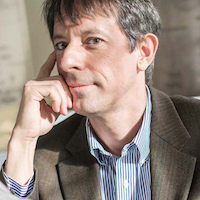In August 2019 the Computing Community Consortium (CCC) and the Association for the Advancement of Artificial Intelligence (AAAI), released A 20-Year Community Roadmap for Artificial Intelligence Research in the US. The Roadmap is the output of a series of three workshops that were held in late 2018 and early 2019, with the goal of identifying challenges and opportunities to effectively inform future federal priorities, including future AI R&D Investments. The CCC and AAAI shared the roadmap findings during the Artificial Intelligence Research: A Community Roadmap scientific session at the 2020 American Association for the Advancement of Science (AAAS) Annual Meeting, which took place in Seattle, Washington in February, 2020.

Ann Drobnis
The session was moderated by Computing Community Consortium (CCC) Director Ann Schwartz Drobnis and included:
- Bart Selman (Cornell University) who was a co-chair of the AI Roadmap workshop series and analyzed The Need for a National AI Research Infrastructure Initiative.
- and Dan Lopresti (Lehigh University) who explained the AI road mapping process in his presentation on The 20-Year AI Roadmap and Its Impacts.
Yolanda Gil (University of Southern California and President of AAAI), who was also a co-chair of the AI Roadmap workshop series, was unable to attend and Bart Selman shared her presentation on The Transformative Potential of AI for Science.

Bart Selman
Bart Selman, President-Elect of AAAI, opened the session with an explanation of why we need a national AI research infrastructure initiative: one, the emergence of (semi-) intelligent autonomous systems, such as self-driving cars and autonomous drones, in society; and two, the shift of AI research from academia to real-world applications, driven in part by deep learning and big data. Autonomous systems are now deployable in the real world due to the increased capability of machine perception—systems are now capable of “sight” and “hearing,” allowing them to operate independently in the real world. Future systems are likely to have even greater abilities—Selman said that by about 2030 $1,000 in compute resources will match the compute and storage capacity of the human brain. These trends require serious consideration as a society, as the impact of AI on employment, warfare, safety, and ethics will affect everyone.

Dan Lopresti
Dan Lopresti’s presentation explained the backstory of the AI Roadmap and the process to create it. In the summer of 2018, the CCC decided that generating a research roadmap for Artificial Intelligence, similar to the 2009 Robotics Roadmap, would be of value to the computing community. The CCC reached out to AAAI, the premier international scientific society for AI with more than 4,000 members and over 300 elected fellows, and enlisted them as a partner in the roadmap process. A series of three workshops focused on forward-looking aspects of AI:
- The workshop on Integrated Intelligence, chaired by Marie des Jardins (Simmons University) and Ken Forbus (Northwestern University), focused on contextualized AI, open knowledge repositories, and understanding human intelligence;
- the workshop on Meaningful Interaction, chaired by Kathy McKeown (Columbia University) and Dan Weld (University of Washington), addressed collaboration, trust and responsibility, and the diversity of interaction channels;
- and the workshop on Self-Aware Learning, chaired by Tom Dietterich (Oregon State University) and Fei-Fei Li (Stanford University), tackled deeper learning for challenging tasks, integrating symbolic and numeric representations, learning in integrated AI/robotics systems.
Key findings from the roadmap include that few of AI’s big challenges can be solved by piecing together individual academic research projects and that many problems are outside of the scope of industry priorities and timelines; therefore, solving the next generation of AI challenges will require stronger ties between academia, industry, and government.
To pursue these ambitious challenges, the AI Roadmap calls for a reinvention of the national AI research infrastructure. A cornerstone of the roadmap recommendations are national institutes for AI: 1) national AI research centers that act as multi-university centers focused on pivotal areas of long-term AI research with decade-scale funding to support on the order of 100 faculty, 200 AI engineers, 500 students, visiting fellows, and the necessary computing infrastructure, and 2) mission-driven AI laboratories, which target problem domains with potential major societal impact (AI-ready homes, schools, etc.) with decade-scale funding to support around 50 permanent AI researchers, 50 visitors from AI Research Centers, 100-200 AI engineers, and 100 domain experts and staff (e.g., health experts collaborating in AI research). Additionally, the report calls for open AI platforms and resources, as well as the creation of AI challenges that foster healthy competition on difficult problems. The impact of the AI Roadmap can already be seen as it was cited in the 2019 NSF program solicitation on a National AI Research Institutes.

Yolanda Gil
Unfortunately, AAAI president Yolanda Gil was unable to attend AAAS so Bart Selman delivered her prepared presentation on the potential of AI to transform science. The presentation highlighted watershed moments in AI throughout the last thirty years including Deep Blue’s defeat of a human chess world champion, the Kismet robot that can recognize and simulate emotions, and IBM’s Watson’s defeat of human Jeopardy champions. In her presentation Gil argued that since current scientific collaboration takes a significant amount of time and effort, AI could be used to capture scientific knowledge and offers an a promising way to increase the speed of scientific discovery. Gil suggested that by 2030 AI systems will independently reproduce major findings in scientific articles, by 2035 AI systems could be used as a research assistant, and by 2040 AI systems may be co-authors of papers with contributions that could include pursuing hypotheses independently and generating narratives that present findings in the context of related work.
During the Q&A portion of the session the panel was asked how the AI community will address the need for greater compute performance going forward. Bart Selman responded that with parallelism you don’t need faster processors as long as you have a greater number of them. Selman compared parallelism to neurons in the brain, stating that neurons are actually pretty slow, but if you have a large amount, as in your brain, you can do a significant amount of computation. Another attendee asked how the community can prevent misuse of AI systems. Selman responded that inherent dual use is a problem for AI systems. Society must work to align AI systems with human values, for instance government grants should continue to address issues of ethics and long-term impacts. Selman also said he sees students who are interested in the ethical questions of these systems and that they have an understanding of the downsides of companies and technologies in this space.
View all the slides and learn more about the “Artificial Intelligence Research: A Community Roadmap” session on the CCC @ AAAS webpage and read the full AI Roadmap here.
Related Links:
- A 20-Year Community Roadmap for Artificial Intelligence Research in the US, CCC workshop report: https://cra.org/ccc/wp-content/uploads/sites/2/2019/08/Community-Roadmap-for-AI-Research.pdf, slide presentation available from https://tinyurl.com/AI-Roadmap-Slides-2019
- The National Artificial Intelligence Research and Development Strategic Plan: 2019 Update, A Report by the Select Committee on Artificial Intelligence of the National Science & Technology Council: https://www.nitrd.gov/pubs/National-AI-RD-Strategy-2019.pdf
- Video and Q&A from the town hall Roadmap presentation at AAAI 2019: https://aaai.org/Conferences/AAAI-19/townhall-a-20-year-roadmap-for-ai-research/
- “Will Artificial Intelligence Write the Scientific Papers of the Future?” Yolanda Gil, Presidential Address, Annual Meeting of the Association for the Advancement of Artificial Intelligence (AAAI), 2020: https://vimeo.com/390611842, slides at https://tinyurl.com/yolandagil-aaai2020
- “Intelligent Systems for Geosciences: An Essential Research Agenda”, Yolanda Gil et al., Communications of the ACM, January 2019, Vol. 62 No. 1, Pages 76-84: http://doi.org/10.1145/3192335, see also video at https://www.youtube.com/watch?v=rWiPAadz-Kk
- “Thoughtful Artificial Intelligence: Forging A New Partnership for Data Science and Scientific Discovery.” Yolanda Gil. Data Science, 1. 2017: http://doi.org/10.3233/DS-170011 https://www.isi.edu/~gil/papers/gil-etal-cacm19.pdf
- Bart Selman: AI and “Specialized Systems,” Carnegie Council for Ethics in International Affairs via Youtube: https://www.youtube.com/watch?v=XS0nFn05ZRg
- CCC / Code 8.7 Workshop on Applying AI in the Fight Against Modern Slavery, workshop webpage: https://cra.org/ccc/events/ccc-code-8-7-workshop-onapplying- ai-in-the-fight-against-modern-slavery/









